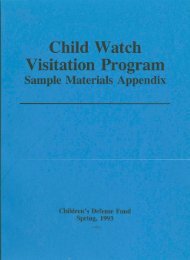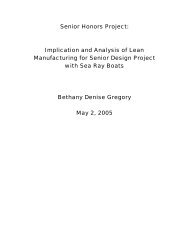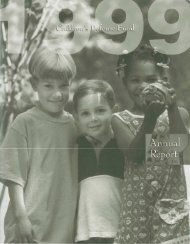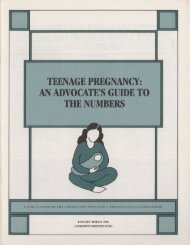children out of school in america - University of Tennessee Digital ...
children out of school in america - University of Tennessee Digital ...
children out of school in america - University of Tennessee Digital ...
Create successful ePaper yourself
Turn your PDF publications into a flip-book with our unique Google optimized e-Paper software.
enroll<strong>in</strong>g students <strong>in</strong> grades 1-12; a <strong>school</strong> for<br />
the general normal student population <strong>in</strong><br />
which a student may advance toward an elementary<br />
<strong>school</strong> certificate or a high <strong>school</strong><br />
diploma; a <strong>school</strong> for which there are no special<br />
requirements for enrollment such as hav<strong>in</strong>g<br />
a severe learn<strong>in</strong>g or physical disability,<br />
want<strong>in</strong>g specialized tra<strong>in</strong><strong>in</strong>g, or be<strong>in</strong>g deta<strong>in</strong>ed<br />
for problems with law enforcement <strong>of</strong>ficials.<br />
b. Non-regular special <strong>school</strong>-a public or private<br />
<strong>school</strong> enrolJ<strong>in</strong>g students <strong>in</strong> grades 1-12;<br />
a <strong>school</strong> for which there are special requirements<br />
for enrollment such as hav<strong>in</strong>g a learn<strong>in</strong>g<br />
or physical disability, want<strong>in</strong>g specialized<br />
tra<strong>in</strong><strong>in</strong>g, or be<strong>in</strong>g deta<strong>in</strong>ed for problems with<br />
law enforcement <strong>of</strong>ficials.<br />
2. Public School-a <strong>school</strong> which is controlled and<br />
supported chiefly by a local, state, or federal<br />
government agency.<br />
3. Parochial <strong>school</strong>-a <strong>school</strong> which is controlled<br />
or supported chiefly by a religious organization<br />
which the child attends <strong>in</strong>stead <strong>of</strong> a public <strong>school</strong>.<br />
4. Other Private School-a <strong>school</strong> which is controIJed<br />
or supported chiefly by private groups<br />
other than religious organizations.<br />
5. Enrollment/Enrolled-for the purposes <strong>of</strong> this<br />
survey, a student is enroIJed <strong>in</strong> a <strong>school</strong> if he is<br />
registered at a <strong>school</strong> and has attended some<br />
days <strong>of</strong> the <strong>school</strong> year. In other words, a student<br />
is enrolled if a regular or non-regular, special<br />
<strong>school</strong> (public or private) has him on a list<br />
<strong>of</strong> <strong>children</strong> enrolled and expects him to attend<br />
<strong>school</strong> there.<br />
6. Special Program-the term "special program" is<br />
used <strong>in</strong> reference to both regular <strong>school</strong> and nonregular,<br />
special <strong>school</strong>. However, any given type<br />
<strong>of</strong> special program might exist <strong>in</strong> a regular but<br />
not a non-regular <strong>school</strong> or vice versa.<br />
(a) "Special programs" <strong>in</strong> regular <strong>school</strong> are for<br />
<strong>children</strong> who have learn<strong>in</strong>g or physical disabilities<br />
which <strong>school</strong> <strong>of</strong>ficials have determ<strong>in</strong>ed<br />
are serious enough to remove the<br />
<strong>children</strong> from regular classrooms for the<br />
whole or part <strong>of</strong> the <strong>school</strong> day but not<br />
serious enough to prohibit them from enroll<strong>in</strong>g<br />
<strong>in</strong> the <strong>school</strong>. The Monitor's Guide<br />
spells <strong>out</strong> types <strong>of</strong> problems for which stu-<br />
164<br />
dents might be placed <strong>in</strong> special progr.ams.<br />
Common types <strong>of</strong> special programs <strong>in</strong> regular<br />
<strong>school</strong>s <strong>in</strong>cluded educable mentally<br />
retarded (EMR) classes, English as a Second<br />
Language (ESL) classes, special read<strong>in</strong>g<br />
classes, speech therapy, classes for<br />
emotionally disturbed, special classes for<br />
gifted and talented <strong>children</strong>, vocational and<br />
occupational tra<strong>in</strong>jng classes.<br />
(b) "Special programs" <strong>in</strong> non-regular special<br />
<strong>school</strong>s are programs to meet the specific<br />
needs <strong>of</strong> the <strong>children</strong> who are enrolled <strong>in</strong><br />
that <strong>school</strong> because they have some general<br />
problem <strong>in</strong> common. Here are a few examples:<br />
( I) A <strong>school</strong> for physically handicapped<br />
could have the same type <strong>of</strong> special<br />
programs as found <strong>in</strong> a regular <strong>school</strong><br />
-EMR, ESL, speech therapy, etc.as<br />
well as special programs for <strong>children</strong><br />
who are deaf, bl<strong>in</strong>d, legs paralyzed,<br />
arms miss<strong>in</strong>g, etc.<br />
(2) A <strong>school</strong> for del<strong>in</strong>quent <strong>children</strong> might<br />
have the same types <strong>of</strong> special programs<br />
found <strong>in</strong> regular <strong>school</strong>s.<br />
(3) A <strong>school</strong> for mentally retarded <strong>children</strong><br />
might have special programs for Educable<br />
(EMR) as well as Tra<strong>in</strong>able<br />
Mentally Retarded (TMR), for emotionally<br />
disturbed, Spanish speak<strong>in</strong>g,<br />
etc.<br />
7. Suspensions. Suspensions are one <strong>of</strong> the most<br />
common discipl<strong>in</strong>ary measures used <strong>in</strong> <strong>school</strong>s.<br />
Due process is <strong>of</strong>ten denied, hear<strong>in</strong>gs, and appeals<br />
are not held, and <strong>of</strong>ten no statistical records<br />
are kept to <strong>in</strong>dicate average duration <strong>of</strong> suspensions<br />
or frequency. A suspension for purposes<br />
<strong>of</strong> tills study is any temporary exclusion <strong>of</strong> a<br />
child from <strong>school</strong> by <strong>school</strong> <strong>of</strong>ficials. Temporary<br />
means anyth<strong>in</strong>g from one to thirty days.<br />
8. Expulsions. Expulsions are long-term (thirty<br />
days or over, or permanent) exclusion <strong>of</strong> a child<br />
from <strong>school</strong> by <strong>school</strong> <strong>of</strong>ficials. The child is<br />
usually not allowed to return to <strong>school</strong> for the<br />
rema<strong>in</strong>der <strong>of</strong> the semester or <strong>school</strong> year. Sometimes<br />
expulsions are labeled "<strong>in</strong>def<strong>in</strong>ite suspensions."<br />
In such cases a child is allegedly sus-














